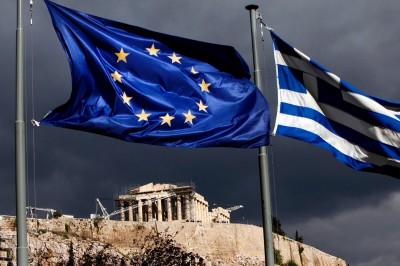NO To Austerity, YES to Democracy: Greece Confronts the EU’s Technocratic Hydra

Thursday, July 9th could go down as the most important day in the European Union’s history. Neither Greece nor the EU seems willing to budge on a bailout deal, and Greek PM Tsipras has leaked to the press that French President Hollande represents the “last hope” in making a deal. [1]
The raw power in the EU’s sprawling constellation of government lies in the hands of the elite power-brokers such as German PM Angela Merkel, but also with financial experts: Commission President Juncker, German FinMin Schaeuble, ECB President Draghi, Council President Tusk and IMF Director Lagarde. On the periphery, second-tier operatives have been trying to help dissolve the tension, while advancing their own interests: US Treasury Sec Lew, IMF chief economist Blanchard, Russian FinMin Siluanov, EU President Shulz, French FinMin Sapin, and now importantly, new Greek FinMin Tsakalotos.
The recent Greek request for a European Stability Mechanism (ESM) loan may end up being too little, too late, with a final result due this Sunday. Reports indicate that France (assuredly with Hollande’s approval) has dispatched a team of economic wizards to Greece to finish a new debt deal by Thursday night. What now appears possible is that Hollande may have sent strong signals for a moderate debt “haircut” in return for strong pension and tax reform. If this turns out to be true, all other actors may bend under his will, except for Merkel. This accounts for Tsipras’ feverish calls for reports from French journalists.
Merkel will continue to dominate the discussion by focusing on fiscal responsibility, and Alexis Tsipras may even renege on his own nation’s referendum in order to save face. A deal seems likely, but anything is possible: Tsipras has shown willingness at points in the last month for severe cuts and compromises, at other times fiercely opposed.
Either way, new deal or Grexit, Greek banks will face closures, downsizing, and mergers. [2] Euro or drachma, unemployment will remain high and pensioners will hang on for the ride, making do with bare necessities. What will become more apparent with each day that passes is the EU’s legitimacy crisis as widespread poverty and emigration plagues Greece.
Citizens of the entire European Union will have to sit idly by as Greek unemployment hovers over 25% and its youth unemployed at 50%, with no immediate help in store. With over 60% of voters voting no in the July 5th Greek bailout referendum, EU leaders and member states will be forced to gaze into a crystal ball of what direct democracy could look like in Europe. Similarly, EU states will admit their own disapproval with debt restructuring and haircuts, their biased assumptions of Greek spending and corruption, and their beef with Greek anti-bailout democracy.
By appealing to fiscal conservatism and neoliberal capitalism, EU technocrats mask the suffering and poverty in not only Greece, but pockets of resistance in southern Europe and beyond (the PIIGS, etc.). The “structural reforms” imposed on the periphery inevitably returns to haunt the core, and the entire EU economy could conceivably contract in the next few years. Democracy and Europe, both being inventions of Greece, will be turned on their heads to support austerity, spreading the suffering and misery to ordinary EU citizens and the larger world economy.
Blame it on brainwashing, inertia, ennui, malaise: at this point there is no united liberal response in European politics to austerity. Greek’s Syriza and partners ANEL banked on a rising tide of socialism, populism, and a European “New Deal”, a renewed Keynesian approach to economic policy, and now is made to appear naïve, foolish, and alone in the international media. Since much poorer countries have been forced to accept bailout terms, so should you, seems to be the gist of the pro-bailout argument.
Already having endured de-facto default and 60 Euro-a-day capital controls, Greece’s coalition parties will compromise due to its weak hand. Even modest debt restructuring could be used to score political points for Tsipras and crew, spinning the new bailout terms as David who faced down Goliath, and at least formed a temporary truce. Yet even this method would not likely work for Greek domestic consumption and could lead to a coalition breakup.
Deal or no deal, Greece will remain broke and EU banks will make billions servicing its debt. As the saying goes, the rigged system has “privatized the gains, and socialized the losses”. There is little mention anymore of the odious nature of the debt, or recent Greek history: the wrecking ball of Nazi-Italian occupation during WWII, the Gladio-led disinfo campaigns, the German reparations only partially paid back, the US-Euro backed juntas of 1967-74 where torture and disappearances were rampant. Truth and honor have no value in the Empire of Lies, and repeated Greek traumas and failed structural adjustment programs mean nothing.
By rallying around the “No” vote in its referendum, Greece has focused debate on the privatization schemes of the EU banks, IMF, World Bank, and the usual crowd of predatory lenders. Greek citizens have shown the world how to use direct democracy as a weapon against the conformist bureaucracy of the EU, in the interests of fairness, justice, and economic freedom.
William Hawes is a writer specializing in politics and environmental issues. You can reach him at [email protected].
Notes:
1) http://www.bbc.com/news/

